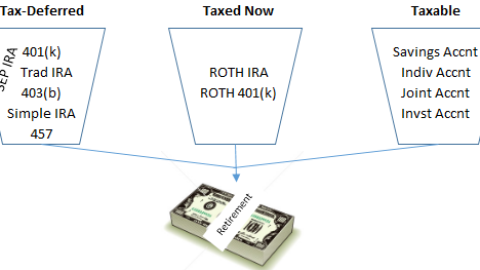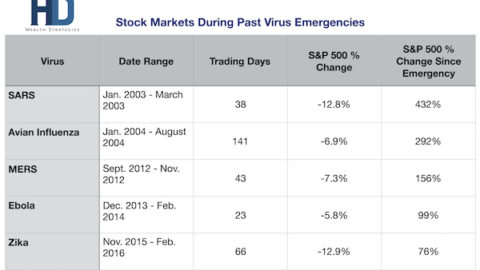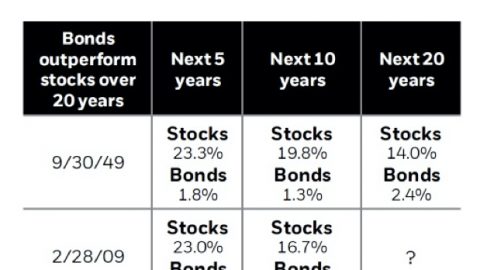Addressing the Narrative of Fear
By: Steven Higgins, Financial Advisor, Principal

There is no shortage of headlines foretelling the certain demise of this enduring bull market. This truly is a “hated” bull market and it has been for its duration of over 10 years. Contrary to popular opinion, this isn’t the longest bull market and it isn’t the biggest. While the global economy is showing signs of weakening, it certainly isn’t a forgone conclusion that a U.S. recession is looming. That being said, we will have a recession; we will always have another recession. Recessions are defined by two consecutive quarters of reductions in the Gross Domestic Product (GDP) and are absolutely a normal part of the economic cycle. While our recent memory and experience may lead us to believe every recession includes a 50% drop in the stock market and 10% unemployment, history tells us that is far from the case. Since 1926 there have been 15 recessions and 9 of them came and went in the middle of a bull market. So, it’s fair to say that recessions usually don’t cause bear markets, which are characterized by a 20% or greater drop in stock prices.
Check out this Chart from First Trust:

Fact.
This is the fourth longest and the fourth largest bull market.*
Fact.
The current bull market return of 376% is less than half the average of the three larger bull markets cumulative return of 828% *
Fact.
Most recessions haven’t coincided with bear markets.*
What about all of this negative Investor Sentiment talk?
Every week since 1987, the American Association of Individual Investors (AAII) asks its members the same question: How do you think the stock market will do over the next six months? Before we make fun of this weekly survey, consider the fact that you have to sign up and register to become a member of AAII. Registering as a member sort of implies a certain aptitude for investments or at least a greater degree of interest than the general public. For the weekly survey ending 8.28.2019, the AAII members reported to be 42.2% bearish with only 26.1% bullish. That survey sounds straight up scary, right? Well, I researched the historical survey results to see just how accurate these self reporting participants were. Long story short, they are so bad at predicting stock market outcomes that you are almost better to do exactly the opposite of what the survey says. Since the current bull market started in March of 2009, the average number of survey respondents reporting to be bearish was 31% while the average number of survey respondent reported to be bullish was 36%. Yes, math wizards, over the same period, 33% of respondents reported as neutral. Author’s note: I have questions about people who actively sign up for a survey and then respond as “neutral.” Also, the fact that respondents are, on average, equally split between bullish, bearish, and neutral essentially revealed the survey to have had a lack of any conviction whatsoever while the S&P 500 with dividends reinvested grew by 420%.* This survey has proven to be a horrible guide for investors. The data not withstanding, the survey gets media attention almost weekly using the seemingly large percentage of bearish “expert” respondents as evidence of approaching market doom.
Advice: Ignore this survey. **
During times of volatility, how bad has the AAII weekly investor sentiment survey been at predicting market outcomes over the following six months? I did the math. Answer: Really bad.

As a financial planning firm, we recognize the challenges that media-generated fear and misunderstandings about data can present to long-term planning and goals. We feel that addressing the issues head on and providing education and context to planning is often a more successful and cost effective alternative to selling our clients products like annuities that are often designed to address short term emotional events. Market volatility and economic realities like recessions are ever-present and should be planned for and dealt with as normal events rather than panicked events. Certainly let us know if you feel like we can help.
* Data Source: www.ycharts.com
** Data Source: www.aaii.com
Securities offered through LPL Financial, Member FINRA/SIPC. Investment Advice offered through HD Wealth Strategies, a registered investment advisor and separate entity from LPL Financial.
The opinions voiced in this material are for general information only and are not intended to provide specific advice or recommendations for any individual. All performance referenced is historical and is no guarantee of future results. All indices are unmanaged and may not be invested into directly. The economic forecasts set forth in this material may not develop as predicted and there can be no guarantee that strategies promoted will be successful. There is no guarantee that a diversified portfolio will enhance overall returns or outperform a non-diversified portfolio. Diversification does not protect against market risk. Bonds are subject to market and interest rate risk if sold prior to maturity. Bond values will decline as interest rates rise and bonds are subject to availability and change in price.
The payment of dividends is not guaranteed. Companies may reduce or eliminate the payment of dividends at any given time.









